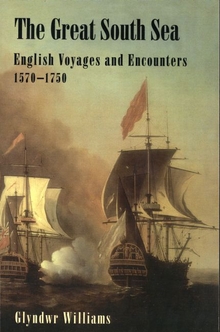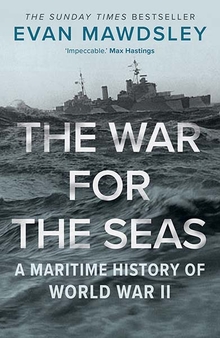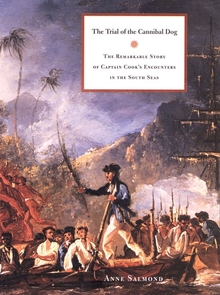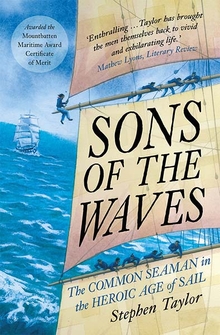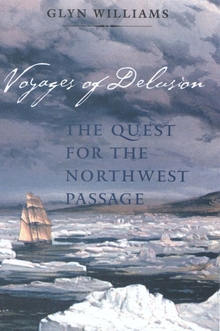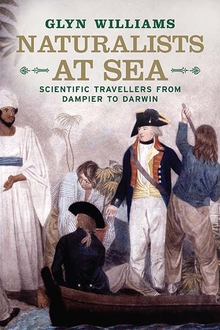The Great South Sea
WARNING
You are viewing an older version of the Yalebooks website. Please visit out new website with more updated information and a better user experience: https://www.yalebooks.com
English Voyages and Encounters, 1570-1750
Glyn Williams
Glyndwr Williams, a leading expert on the exploration of the Pacific Ocean, draws on printed accounts of South Sea voyages as well as unpublished records—buccaneer journals, expedition papers, and government documents from public and private archives. For English seamen preying on Spanish trade and treasure, the South Sea was limited to the waters lapping the shores of Chile, Peru, and Mexico. But the vision was wider for others, Williams reveals. Cartographers at home in England, untrammeled by the constraints and dangers of actual voyaging, produced speculative maps with a vast Terra Australis Incognita, with fabulous Islands of Solomon, and with a promised short passage from Atlantic to Pacific. Satirical and utopian writers from Joseph Hall to Jonathan Swift found ample space in the wide ocean for their fictional travelers. And contemporary published voyage accounts—marvelous, though not necessarily reliable—further blurred the line between real and imaginary, contributing to the alluring, exotic image of the South Sea that took root in English folk memory and long outlasted the age of the buccaneers.
A selection of the History Book Club, Book-of-the-Month Club, and the International Book Club
"At first sight, one would expect this book to be one more overall study of early voyages to the Pacific Ocean. . . . However, it is much more than that: it reflects a wider view, sets the story against a background of national and personal ambitions, and describes the petty jealousies and seemingly endless political maneuverings of politicians, entrepreneurs, seagoing traders, and the ships’ commanders themselves. . . . A major work."—John Dunmore, American Neptune
"A fundamental and attractive book which brings together the fruits of a lifetime's research, teaching, and writing on the subject. . . . This handsomely produced and illustrated book is a major contribution not only to the history of European beginnings in the Pacific, but also to the evolution of imperial strategies, the history of seafaring and exploration, and the development of the European mind. A truly magnificent achievement."—G.V. Scammell, International History Review
"[A] well-written and handsome book . . .This book is a welcome contribution to the history of Pacific exploration in the early-modern period."—Brian P. Dolan, Journal of Historical Geography
"An intriguing and elegant history of European adventures, real and otherwise, in the South Seas during the 16th to 18th centuries. . . . High scholarship on Europe's early gleanings in the Pacific, clever in its gleaning between the lines and a delight to read."—Kirkus Reviews
"[This book] provides a fascinating guide to the vexed question of exactly whereabouts on the North American coast Drake made landfall before crossing to Asia. . . . This is a superbly accomplished book, mixing narrative and analysis in just the right measure, continuously beguiling, impeccable in its scholarship but of absorbing interest to the general reader. Other names have been touted recently as doyens of eighteenth-century naval history, but my money is firmly on the erudite nose of Professor Williams as the true master of the subject."—Frank McLynn, Literary Review
"Equipped with extensive notes, references and bibliography, this is a first class modern account of Pacific exploration up to just before the James Cook saga."—Alan Cameron, Lloyd's List
"William's work is thoroughly researched and supported by contemporary maps, each drawn as new travel reports expanded the picture of the Pacific."—Sea History
"Williams presents a masterly account of the human dramas and often tragedies of these voyages, drawing not only on published travel accounts, but also on memoirs, correspondence, periodicals, and unpublished manuscripts in the Public Record Office."—Romuald Ian Lakowski, Sixteenth Century Journal
"This is an erudite and scholarly work, examining the South Sea adventures over two centuries of English buccaneers, privateers and naval expeditions, beginning with Sir Francis Drake and ending with the English naval commander, George Anson."—Alan Judd, Sunday Times
"The fascination of . . . "The Great South Sea," is in its explanation of the terrible errors, misapprehensions and stubbornness of men facing the unknown. That and their unquenchable pride, hardiness and bravery."—Duncan Spencer, Washington Times
Publication Date: December 11, 1997
42 b/w illus.

